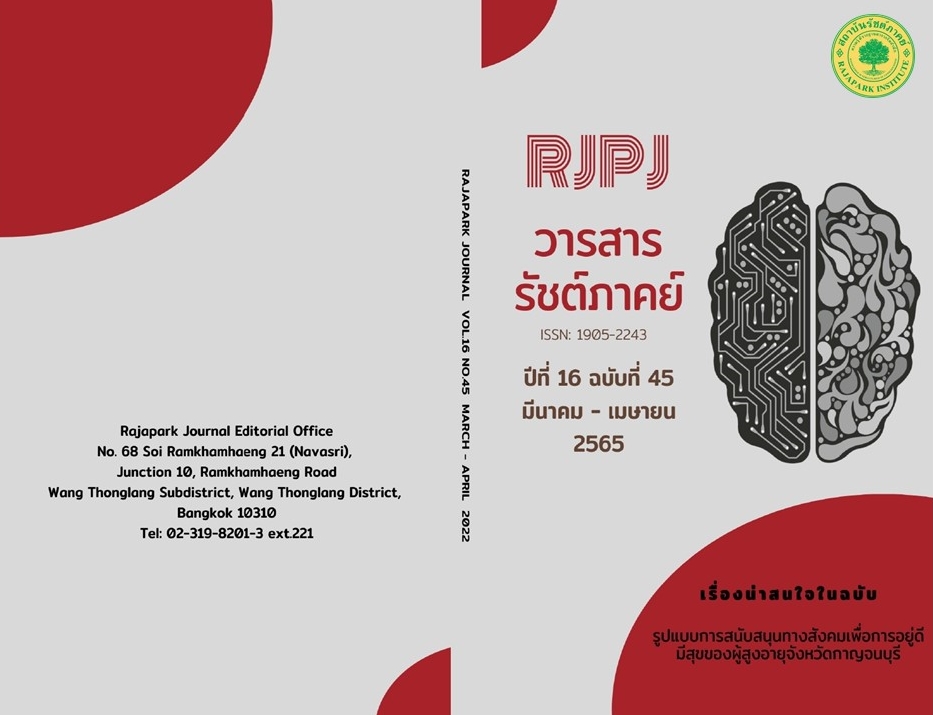Social Support Models for Elderly’s Well-Being in Kanchanaburi Province
Main Article Content
Abstract
The objective of this research was to study and analyze social support, including the search for social support models for the elderly's well-being. It was qualitative research that collected data from in-depth individual interviews, group discussions, field observations, and notes, and used content-based data analysis and interpretation of the phenomena that occurred. The results revealed that: social support for the elderly’s well-being was based on (1) self-level or self-reliance that was an attempt to help themselves as much as possible, to make themselves feel valued; (2) family level was the closeness with the elderly, who played an important role in problem-solving of physical, mental, and social; and (3) community level was the cooperation of groups of people involved in the implementation of care and support for happiness creation that was consistent with family and community problems. There were 3 characteristics of social support models for the elderly’s well-being: (1) a family characteristic was the closeness of all family members. Love, gratitude, and cooperation were essential; (2) the nature of the community was one of cooperation and coordination of the benefits of both the family and community stakeholders; and (3) a key feature of social networks was the collaboration of 3 large groups: health, social service, and local community. These provided care and social support at the family, area, and provincial levels.
Article Details

This work is licensed under a Creative Commons Attribution-NonCommercial-NoDerivatives 4.0 International License.
Views and opinions appearing in the Journal it is the responsibility of the author of the article, and does not constitute the view and responsibility of the editorial team.
References
Christensen, L.B., Johnson, R.B., & Turner, L.A. (2015). Research Methods, Design and Analysis, Global Edition (12th ed.). United States of America: Pearson.
Dai, Y., et al. (2016). Social Support and the Self-rated Health of Older People A Comparative Study in Tainan Taiwan and Fuzhou Fujian province. Medicine, 95(24), 1-14. https://doi: 10.1097/MD.0000000000003881
Department of Older Persons Ministry of Social Development and Human Security. (2017). Elderly Self-Care Knowledge and Potential Development Series. "Good Health". Retrieved October 14, 2019, from http://ltc-older.dop.go.th/th/know/5/115
Kanchanaburi Provincial Office of the Comptroller General's Department. (2020). Kanchanaburi Provincial Development Plan (2018 – 2022). Year 2019 Review Edition. (Online). Retrieved March 21, 2020. from https://www.opsmoac.go.th/ kanchanaburi-strategic-files-411491791809
Lu, S., et al. (2020). Association of Formal and Informal Social Support with Health-Related Quality of Life Among Chinese Rural Elders. International Journal of Environmental Research and Public Health, 17(4), 1351. https://doi.org /10.3390/ijerph17041351
Miankerd, W. (2016). The Social Care System for Elderly. Journal of Social Work, 24(2), 150-177.
Miles, M. B., & Huberman, A. M. (1994). Qualitative Data Analysis: An Expanded Sourcebook (2nd ed.) Thousand Oaks: Sage.
National Research Council of Thailand. (2012). Professional Research Ethics and Best Practice (2nd ed.). Bangkok: Chulalongkorn University.
National Statistical Office, Ministry of Digital Economy and Society. (2017). Active Ageing Index of Thai Elderly. Bangkok: Text and Journal Publication Company Limited.
Office of the National Economic & Social Development Council (NESDC). (2019). National Economic and Social Development Plan No. 12 (2017 – 2021). Retrieved October 10, 2019. from https://www.nesdc.go.th/ewt_w3c/ewt_dl_link.php?nid=6421
Office of the Permanent Secretary, Ministry of Social Development and Human Security. (2019). Ministry Strategy (2017 – 2021) and Strategy of the Office of the Permanent Secretary (2017 – 2021). Retrieved October 14, 2019. from https://www.ubu.ac.th/web/files_up/03f2017060210435158.pdf
Patil, B., et al. (2014). Study of Perceived and Received Social Support in Elderly Depressed Patients. Journal of Geriatric Mental Health, 1(1), 28-31.
Royal Thai Government Gazette. (2018). The 20-Year National Strategy (2018-2037). Retrieved October 10, 2019. from http://www.ratchakitcha.soc.go.th/DATA/PDF/ 2561/ A/082/T_0001.PDF
Shiba, K., Kondo, N., & Kondo, K. (2016). Informal and Formal Social Support and Caregiver Burden: The AGES Caregiver Survey. Journal of Epidemiology, 26(12), 622-628. https://doi:10.2188/jea.JE20150263
Strauss, A., & Corbin, J. (1994). Grounded Theory Methodology: An Overview. In N. K. Denzin, & Y. S. Lincoln (Eds.), Handbook of Qualitative Thousand Oaks, CA: SAGE.
United Nations Population Fund: UNFPA & HelpAge International. (2020). Executive Summary of 21st Century Aging: Celebrations and Challenges Executive Summary. Retrieved December 7, 2020, from http://www.unfpa.org/Thai summary Ageing in the 21st Century_0.pdf
Wenger, G.C. (1991). A Network Typology: From Theory to Practice. Journal of Aging Studies, 5(2), 147-162.
Yupas Y., & Prachantasena A. (2019). Practical Guidelines for Improving the Quality of Life of Elderly People by Community. Journal of the Humanities and Social Sciences Mahasarakham University, 38(6), 104-110.


